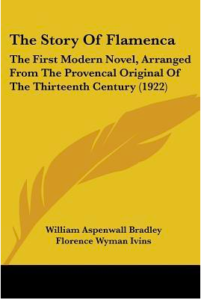What a delightful thing to read in the lead up to Valentine’s Day.
Being both thrifty and impatient, I actually read the online copy for free at The Hathi Trust digital library, as the original came out in 1922 and is yet unavailable for e-reader. Since I’ve been listening to Rosalia’s El Mal Querer on constant repeat these past few weeks, I wanted to experience the text that had inspired this terrific flamenco-fusion album, or at least the most conveniently accessible English translation.
 After reading the quite short novel(la?) I was genuinely surprised it isn’t more widely known. Perhaps because it was originally written in Occitan and is thus less accessible than other, more famous romances. Of course, it isn’t devoid, at least in this somewhat abridged translation by William Aspenwall Bradley, of the problems that plague other stories of the time. But even writers of our era trade in insta-love and in the diminishing of the seriousness of sexual assault. Flaws like these are almost easier to forgive in older works, because the choices of the authors and translators can be more clearly viewed through the lens of the intervening years.
After reading the quite short novel(la?) I was genuinely surprised it isn’t more widely known. Perhaps because it was originally written in Occitan and is thus less accessible than other, more famous romances. Of course, it isn’t devoid, at least in this somewhat abridged translation by William Aspenwall Bradley, of the problems that plague other stories of the time. But even writers of our era trade in insta-love and in the diminishing of the seriousness of sexual assault. Flaws like these are almost easier to forgive in older works, because the choices of the authors and translators can be more clearly viewed through the lens of the intervening years.
Anyway, this is the story of the beautiful Flamenca, whose father, Count Guy of Nemours, would rather she live as a nearby chatelaine rather than become the monarch of a far-flung court. So he decides to marry her to Archambaut, lord of Bourbon and one of the best knights of the age. Flamenca and Archambaut meet and are impressed by what they see, so consent to marry. After a days-long wedding feast in Nemours, Archambaut rushes to Bourbon to prepare another feast to welcome his new bride home. He asks the King and Queen of France themselves the honour of escorting, with their many knights, Flamenca on her journey to him.
Unfortunately, the King proceeds to show a little too much favour to Flamenca, and by the time the royal party have left Bourbon, Archambaut has worked himself into a right fervor of jealousy. Over the next few weeks, anything she does or says is fuel for his paranoia. Soon, he has her cloistered in a tower with her two ladies-in-waiting, Alis and Margarida, letting them out only for church services. The years pass and no one does anything to help her or her ladies (thanks, Dad!) till a young knight named Guillem learns of her plight. Struck by the idea of Love, he travels to Bourbon and puts in motion a plan to meet her and win her love.
This version of the tale ends with the lovers happily fooling the awful husband. The original text in verse continues a little longer before petering out abruptly, though not before granting Flamenca a little more freedom. I understand Mr Bradley’s choice to end his adaptation cleanly, tho I still rather wish I had greater access to the original. Fortunately, Mr Bradley’s introduction is quite good, explaining his choices and scholarship, as is the story overall. The problematic bits actually stand out less than the progressive bits, with at least one really terrific part considering the nature of Fear, Shame and Love. I was honestly prepared for something much more depressing, given the themes of Rosalia’s album, but each work of art is good, and deeply satisfying, in its own way. You could do much, much worse than to check out either.
